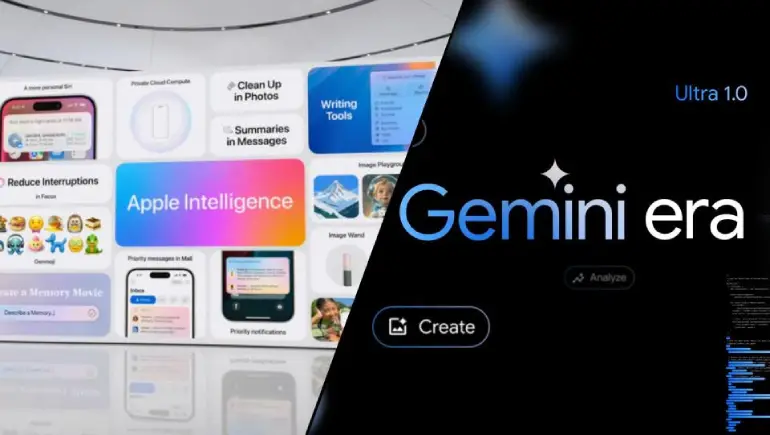
In 2025, the race to dominate the artificial intelligence landscape has reached a pivotal moment. With Apple unveiling its highly anticipated Apple Intelligence platform and Google expanding the capabilities of Gemini, the battle for AI supremacy is in full swing. These two tech titans are not just creating smarter tools — they are redefining how users interact with technology in their daily lives.
Apple’s new AI system, Apple Intelligence, is deeply integrated into iOS, iPadOS, and macOS. It leverages on-device processing for enhanced privacy while delivering smarter automation, context-aware suggestions, and generative capabilities like writing summaries, generating smart replies, and even creating custom emoji called Genmoji.
Apple Intelligence sets itself apart by staying true to Apple’s core philosophy: privacy-first AI. Most processing is done on-device using the powerful Apple silicon chips, and more complex requests are handled using “Private Cloud Compute,” ensuring data security at all levels. Siri also gets a major upgrade, becoming more conversational and capable of understanding context across apps — a long-awaited leap in Apple’s virtual assistant evolution.
On the other side, Google Gemini continues to lead with its advanced generative AI models, now embedded in everything from Google Search and Android to Gmail and Docs. With multimodal capabilities (understanding text, images, audio, and video), Gemini is built to handle more diverse and complex queries. The Gemini 1.5 update further improved latency, reasoning, and integration across services.
Unlike Apple’s approach, Google relies heavily on cloud processing, which allows for faster scalability and access to powerful AI resources. Gemini is also tightly integrated with Google’s vast ecosystem, enabling it to deliver a more seamless cross-platform experience for Android users.
| Feature | Apple Intelligence | Google Gemini |
|---|---|---|
| Privacy | On-device processing & Private Cloud Compute | Primarily cloud-based |
| Integration | Deep iOS/macOS/iPadOS integration | Works across Android, Chrome, and Google services |
| Virtual Assistant | Upgraded Siri with contextual memory | Gemini assistant with multimodal input |
| Custom Generation | Genmoji, text rewriting, smart replies | Image generation, content creation, video assistance |
| Launch Timeline | Fall 2025 (with iOS 18) | Already available with continued updates |
Apple focuses on refined user experience, aiming to make its AI "invisible but indispensable." Its AI enhancements are subtle but impactful — rewriting emails in your tone, auto-prioritizing notifications, or summarizing a webpage in Safari.
Google, on the other hand, emphasizes productivity and capability. Gemini can draft blog posts, answer complex math problems, generate images, and even function as a real-time coding assistant, making it ideal for power users and developers.
The winner may not be clear yet, but what’s certain is this: users are the real beneficiaries of this escalating AI competition. Whether you're an Apple user enjoying seamless privacy-first assistance or a Google fan leveraging Gemini’s breadth and depth, the future of AI looks more powerful and accessible than ever.
The AI battle between Apple Intelligence and Google Gemini is more than just a rivalry — it represents the next evolution in how we live, work, and interact with digital environments. Apple brings elegance and privacy, while Google offers versatility and raw power. As both companies continue to innovate, the AI arms race in 2025 is just heating up — and the best is yet to come.



-112x63.27.webp)




-132x74.57.webp)



Comments
There are no comments for this Article.